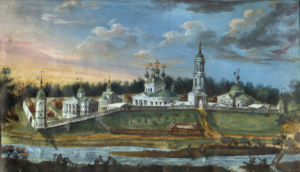10 October OS 2020– Friday of the 3rd Week of St. Luke, Holy Martyrs Evlampios and Evlampia, Venerable Fathers of Optina
Today, the tenth of October on the Orthodox calendar, is the feast of the Venerable Fathers of Optina, a golden chain of God-bearing elders who flourished in Optina Monastery in Russia from the early 19th century until the monastery was closed by the atheist revolutionaries in 1928. They are saints newly revealed for the consolation and edification of the universal Church of the latter times, and by their prayers and holy teaching we can learn to travel the path of humility and the hidden life in Christ, in order to tread the extremely narrow way, difficult to discern, leading us to salvation in this period of the Church’s history, when spiritual delusion is everywhere, those who are publicized as God-bearing elders are not, and those who are genuine spiritual guides hide themselves and offer counsel with reluctance, knowing their own capacity for delusion. We are thrown back upon the expedient of reading books and leading a life of mutual counsel and support, the way of life that St. Ignaty Brianchaninov, a spiritual offspring of Optina Elder Leonid, recommends as the safe path in these latter days. In such a situation, the lives and counsels of very recent true elders is a precious treasure.
The reading from the Holy Gospel for Matins of a monastic saint, read today in those churches celebrating services for the Optina fathers, is Matthew 11: 27-30.
The Lord said to His disciples: All things are given unto Me by My Father. And no man knoweth the Son, but the Father; neither knoweth any man the Father, save the Son, and he to whomsoever the Son willeth to reveal Him. Come unto Me, all ye that labor and are heavy laden, and I will give you rest. Take my yoke upon you, and learn from Me that I am meek and lowly in heart; and ye shall find rest unto your souls. For My yoke is easy, and My burden is light.
Blessed Theophylact of Ochrid, in his commentary on St. Matthew, answers the question, “What is the yoke of Christ?” thus:
The yoke of Christ is humility and meekness. For he who humbles himself before all men has rest and remains untroubled; but he who is vainglorious and arrogant is ever encompassed by troubles as he does not wish to be less than anyone but is always thinking how to be esteemed more highly and how to defeat his enemies. Therefore the yoke of Christ, which is humility, is light, for it is easier for our lowly nature to be humbled than to be exalted. But all the commandments of Christ are also called a yoke, and they are light because of the reward to come, even though for a time they appear heavy. – The Explanation of the Holy Gospel According to St. Matthew, by Blessed Theophylact (Chrysostom Press 1992)
The yoke of Christ, then, can be understood as being humility and can also be understood as being the commandments of the Gospel. The two, of course, are intimately related: We attempt to carry out the Gospel commands, and we find that by our own power we cannot. This realization brings on a deeper understanding of ourselves – that we are dust and ashes, that all is given by God and we have nothing of ourselves – and thereby to humility. Once we give up the heavy burden of the illusion of self-sufficiency and take on ourselves the light yoke of humility, all goes well. There will be many external trials and temptations – indeed these normally increase for those who attempt to follow the Gospel – but within we are at peace.
When reading the counsels of the Optina elders, one is struck by the constantly recurring themes of humbling oneself, giving up one’s self-will, and total reliance on God. These men had the prophetic spirit, and they knew that terrible times lay ahead for the Church. They knew that only the most profound humility would carry the faithful through the trials that were shortly to befall. Their entire century-long ministry can be seen as a catechesis preparing an entire people for martyrdom.
Here is one of my favorite quotes from the Optina fathers, a word of counsel from the Elder Nikon, a confessor for the Faith persecuted by the Bolsheviks as well as a monastic saint (he died prematurely from the sufferings of imprisonment and exile, in 1931, at the age of 43):
One must always pray that the Lord will show him the way…Let us pray to the Lord that He will save us and will come to our aid in times of sorrow and need. I see no other refuge or hope. Human solutions are vain and mistaken. When you have to endure something which is very difficult, but you know that it is not of your own will, you receive moral relief and peace of soul. May God’s will be done! May the Lord not discredit our faith and devotion to His will. Our only hope is in God. He is our firm foundation, for everything else is unsure. You absolutely do not know where it might be better, where it might be worse, or what to expect. May God’s will be done! Our work is to preserve ourselves in the faith, and to keep ourselves from every sin, and entrust everything else to God. – Living Without Hypocrisy, Spiritual Counsels of the Holy Elders of Optina (Holy Trinity Monastery 2005)
“Our work is to preserve ourselves in the faith, and to keep ourselves from every sin, and entrust everything else to God.”
Amen.
The Lives of the Elders Moses and Joseph of Optina in English are published by Holy Transfiguration Monastery. The Lives of all of the other Elders are available in English from St. Herman Press.

